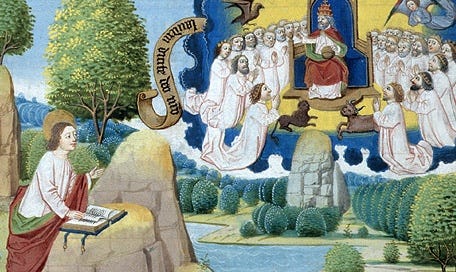This begins an occasional series of meditations on Psalm 103, which I introduced here. The twin devotions of Benedictine spirituality are holy reading (lectio divina), based on deep contemplation of the sacred word, and the Divine Office, rooted in praying the Psalms daily. These posts are the fruits of lectio. (I’ll try to keep them short, so they can be read in less than five minutes.)
Bless the Lord, O my soul;
and all that is within me, bless his holy name!
Bless the Lord, O my soul,
and forget not all his benefits
Psalm 103:1-2
The word at the beginning and end of Psalms 103 and 104 travels in two directions: upward to God and downward to us. When we hear "bless" in English, we think of invoking divine favor—or maybe chasing the devils away from a sneeze or making the sign of the cross. If we're from the south, we may say "aw, bless his heart" when some poor soul disappoints the angels. By and large, we're trying to get God's attention and make holy the profane, to call down a benefit on something.
But the Bible is full of passages of humans blessing God, and of course we can't make God more holy. Instead, the meaning here is "praise." The Hebrew underlying "bless" is barak (brk), and it has a lot of meanings based on context, most of which are based on relationships between two parties. So when we begin and end Psalms 103 and 104 with "Bless the Lord," we're singing God's praises. We're blessing Him by acknowledging His greatness, and that's what these Psalms are all about.
This praise comes from deep, deep within us. We are praising the Lord with everything we have and everything we are. The word that is translated "soul" here is my throat, my breath, my very life, while the word behind "all that is within me" is literally my guts and entrails, the center of myself. We are breathing deep, going down within us, and unleashing our mighty song of praise across the world to this God, whose many gifts, many wonders, many facets the Psalmist is about to enumerate, like Whitman's yawp over the roofs of the world:
I too am untranslatable;
I sound my barbaric yawp over the roofs of the world.
Whitman's "Song of Myself" is essentially turned inward in a kind of Romantic pantheistic narcissism, but his ragged verse has an energy that, like some of the Psalms, captures the wonder of creation.
Whitman travels inward, but not upward. C.S. Lewis, on the other hand, got it right in The Last Battle, when the unicorn says:
“I have come home at last! This is my real country! I belong here. This is the land I have been looking for all my life, though I never knew it till now.... Come further up, come further in!"
He's talking about heaven, but if we look at it through the lens of Augustine, we see the journey of the soul deeper into the self and higher upward to God, who is more interior than my inmost self, and higher than my highest summit. ("Interior intimo meo, et superior summo meo." Confessions, 3.6.11)
This is the call of the Psalms: God is deeper within us than we can penetrate, and higher than we can imagine.
Prayer
Lord, may we bless you with all our being, and never forget the many blessings you have showered upon us.
Meditation
How do we recognize the wonder of God's creation in the world? How do we call upon the power of the Spirit He placed deep within us at our baptism and confirmation?




